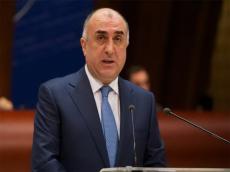|
|
TODAY.AZ / Politics
FM: Double standards serve to instability
02 October 2015 [12:40] - TODAY.AZ

By Sara Rajabova - AzerNews
Double standards in application of the UN Charter principles contribute to instability, stalemate in conflict settlement processes and have the potential to escalate the situation.
Azerbaijan’s Foreign Minister Elmar Mammadyarov made the remark at the high-level thematic debate of the UN General Assembly on the theme of “Maintenance of international peace and security” in commemoration of the seventieth anniversary of the UN on October 1.
Mammadyarov said since the establishment of the UN, significant achievements have been attained in practical implementation of the purposes and principles of the UN Charter, the foreign ministry reported.
“Throughout this period, the international security environment has changed considerably. Threats have become more complex and interlinked, the line between traditional and emerging challenges has become blurred. The balance of power in international relations has also shifted. What we also observe is that the principles of the UN Charter guiding inter-state relations are being misinterpreted or implemented with reservations, if not neglected at all, while some of them are being referred to cover up unlawful actions: the threat or use of force, territorial acquisitions, and forcible population displacement,” the minister said.
He noted that double standards in application of the mentioned principles opens free pass to instability.
Mammadyarov further said the deterioration of the security throughout the world especially during the past two decades has increased human sufferings.
He noted that this has also drained huge resources from the UN, which is evident from the significant increase in its peacekeeping activities. The minister added that therefore, there is a need for more proactive efforts by the UN in conflict prevention, mediation and peace building.
“We regard the ensuring coherence and balance among core functions of the United Nations as a key prerequisite for realization of the purposes and principles of the UN Charter. In international relations, states should make efforts to maintain international peace and security to enable conditions for sustainable development and cooperation and promoting respect for human rights,” Mammadyarov said.
He stressed that the vast majority of human rights violations are directly or indirectly related to armed conflicts and blatant disregard of the norms and principles governing inter-state relations.
“Therefore, it would be appropriate if the United Nations had a reinvigorated approach to addressing international security with the similar perseverance and energy as it rightly embraces on the development agenda. Probably, we might consider the idea of setting tangible security goals to improve collective measures on prevention, removing and suppression of aggressions against the sovereignty and territorial integrity of states, terrorism, violent extremism and other threats to the peace,” the minister said.
In this regard, Mammadyarov specifically referred to the ongoing conflict between Armenia and Azerbaijan, stressing that Armenia’s destructive policy represents a serious challenge to the purposes and principles of the UN Charter and to the organization as a whole.
“Armenia continues to use force against the sovereignty and territorial integrity of another member state and occupy its territories, to enjoy impunity for mass atrocities against the Azerbaijani civilians, to consolidate the current status quo of the occupation, to disregard the relevant resolutions of the UN Security Council and to disrupt any attempt to settle the conflict by peaceful means on the basis of international law. For more than twenty years, Azerbaijan has been waiting for effective international actions with respect to Armenia’s grave breach of peace and act of aggression,” Mammadyarov said.
Armenia occupied over 20 percent of Azerbaijan's internationally recognized territory, including Nagorno-Karabakh and seven adjacent regions, after laying territorial claims against its South Caucasus neighbor that had caused a lengthy war in the early 1990s.
The UN Security Council has adopted four resolutions on Armenia's withdrawal from the Azerbaijani territory, but they have not been enforced to this day.
URL: http://www.today.az/news/politics/144102.html
 Print version
Print version
Connect with us. Get latest news and updates.
See Also
- 01 September 2025 [18:46]
Azerbaijan strengthens global role through SCO engagement - 01 September 2025 [15:30]
President of Azerbaijan: The Zangezur Corridor will soon become another important segment of the Middle Corridor - 01 September 2025 [15:14]
President Ilham Aliyev: Since 2022, the volume of cargo traffic along the Middle Corridor through Azerbaijan has increased by almost 90 percent - 01 September 2025 [15:12]
President Ilham Aliyev: Over the past two years, Azerbaijan-China relations have reached a qualitatively new level - 01 September 2025 [14:19]
President Ilham Aliyev addresses SCO Plus meeting underway in Tianjin, China - 01 September 2025 [13:24]
Palestinian ambassador thanks Azerbaijan for humanitarian support - 01 September 2025 [13:06]
Trial continues in Baku against Armenian war crimes suspects - 01 September 2025 [12:48]
Expired ammunition to be destroyed in Pir?k??kül and A?d?r? - 01 September 2025 [12:46]
President Ilham Aliyev meets with Prime Minister Nikol Pashinyan in Tianjin - 01 September 2025 [11:47]
President Ilham Aliyev: We are determined to further expand cooperation with brotherly Uzbekistan
Most Popular
 Azerbaijan–China relations: political and economic panorama [ANALYSIS]
Azerbaijan–China relations: political and economic panorama [ANALYSIS]
 Azerbaijani President Ilham Aliyev holds meeting in Tianjin with Chinese President Xi Jinping [PHOTOS/VIDEO]
Azerbaijani President Ilham Aliyev holds meeting in Tianjin with Chinese President Xi Jinping [PHOTOS/VIDEO]
 Hikmet Hajiyev: President Ilham Aliyev to hold meetings with leading Chinese companies
Hikmet Hajiyev: President Ilham Aliyev to hold meetings with leading Chinese companies
 UN Security Council to discuss European push for Iran nuclear sanctions reinstatement
UN Security Council to discuss European push for Iran nuclear sanctions reinstatement
 Russia can not reclaim frozen assets without paying reparations to Ukraine, says EU official
Russia can not reclaim frozen assets without paying reparations to Ukraine, says EU official
 Weekly review of Azerbaijan’s precious metals market
Weekly review of Azerbaijan’s precious metals market
 President Ilham Aliyev meets with Acting Head of China Energy Engineering Corporation Limited Ni Zhen in Tianjin [PHOTOS/VIDEO]
President Ilham Aliyev meets with Acting Head of China Energy Engineering Corporation Limited Ni Zhen in Tianjin [PHOTOS/VIDEO]
